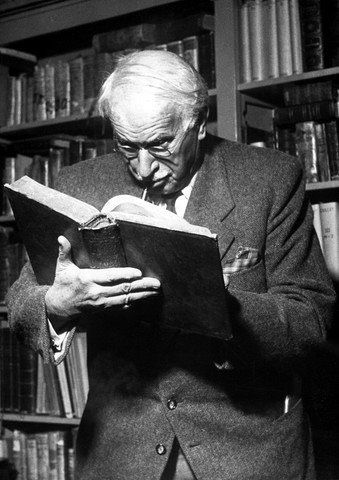「全能の神聖な存在という考えは、意識的ではないにしても無意識的にどこにでも存在します。それは、それが元型であるからです。 精神の中には何らかの優れた力があり、それが意識的に神でないとしても、それは少なくとも聖パウロの言葉を借りれば「腹」である。 したがって、私は神の概念を意識的に認めるほうが賢明であると考えています。なぜなら、そうしなければ、他の何かが神とされるからであり、通常は、「啓蒙された」知性だけが生まれ得るような、全く不適当で愚かな何かが神とされるからです。」 — CG ユング
„The idea of an all-powerful divine Being is present everywhere, unconsciously if not consciously, because it is an archetype. There is in the psyche some superior power, and if it is not consciously a god, it is the "belly" at least, in St. Paul's words. I therefore consider it wiser to acknowledge the idea of God consciously, for, if we do not, something else is made God, usually something quite inappropiate and stupid such as only an "enlightened" intellect could hatch forth.“ — C.G. Jung
新約聖書 マタイによる福音書12:43〜45
汚れた霊が人から出て行って、水のない地をさまよいながら休み場を捜しますが、見つかりません。そこで、『出て来た自分の家に帰ろう』と言って、帰って見ると、家はあいていて、掃除してきちんとかたづいていました。そこで、出かけて行って、自分よりも悪いほかの霊を七つ連れて来て、みな入り込んでそこに住み着くのです。そうなると、その人の後の状態は、初めよりもさらに悪くなります。邪悪なこの時代もまた、そういうことになるのです。
ヤボクの渡しで天使(集合意識の象徴)と格闘するヤコブ(創世記32:22~32)
Jacob wrestling with an angel (symbol of collective consciousness) at Jabbok's Pass (Genesis 32:22-32)
「これらの問題に対する私の態度は、患者が本当に教会の会員である限り、彼は真剣であるべきだということです。彼は本当に誠実にその教会の会員であるべきであり、医者に行くべきではありません」彼が神とともに解決すべきだと信じるとき、彼の葛藤は解決されるのです。」
"My attitude to these matters is that, as long as a patient is really a member of a church, he ought to be serious. He ought to be really and sincerely a member of that church, and he should not go to a doctor to get his conflicts settled when he believes that he should do it with God."
- ~Carl Jung, CW 18, Para 618-620
人生後半の私の患者たち、つまり35歳以上の患者の中で、最後の手段として人生に対する宗教的な見方を見つけることが問題ではなかった人は一人もいませんでした。 彼ら全員が病気になったのは、あらゆる時代の生きた宗教が信者に与えてきたものを失ったからであり、宗教的見解を取り戻さなかった人は誰も本当に癒されていないと言っても過言ではありません。
〜CG ユング、心理療法士、または聖職者。 CW 11: 心理学と宗教: 西と東、パラ。 509.
Among all my patients in the second half of life — that is to say, over thirty-five — there has not been one whose problem in the last resort was not that of finding a religious outlook on life. It is safe to say that every one of them fell ill because he had lost what the living religions of every age have given to their followers, and none of them has been really healed who did not regain his religious outlook.
~C.G. Jung, Psychotherapists or the Clergy. CW 11: Psychology and Religion: West and East, para. 509.
「ユングは「私の仕事の主な関心は、神経症の治療ではなく、むしろヌミノースへのアプローチにある」と書いています。しかし、実際には、ヌミノースへのアプローチこそが真の治療であり、ヌミノース体験に到達する限り、あなたは病理の呪縛から解放される。まさに病気がヌミノースの性格を帯びてくるのです。"
この引用は、ユング分析について本質的に重要なことをすべて引用しています。もし、ヌミノースと関係を築くことができなければ、治療は不可能であり、期待できるのは、社会的適応の改善だけである。しかし、それでは分析者に何が残されているのでしょうか?
~マリー=ルイーズ・ヴォンフランツ、『心理療法』、シャンバフラ出版、1990年
“The main interest of my work,” writes Jung, “is not concerned with the treatment of neurosis but rather with the approach to the numinous. But the fact is that the approach to the numinous is the real therapy and inasmuch as you attain to the numinous experiences, you are released from the curse of pathology. Even the very disease takes on a numinous character.”
This citation cites everything of essential importance about a Jungian analysis. If it is not possible to establish a relationship with the numinous, no cure is possible; the most one can hope for is an improvement in social adjustment. But then, what is left for the analyst to do?
~Marie-Louise VonFranz, Psychotherapy, Shambahla Publications, 1990
JF
私たちの現在の文明状態は、宗教が何を意味するのかをますます理解できなくなっています。 ヨーロッパはすでに人口の半分を古代の異教よりもひどい精神状態で失っている。
~~カール・ユング、レターズ Vol. II、597ページ。
Our present state of civilization becomes more and more unable to understand what a religion means. Europe has already lost half of its population to a mental state worse than ancient paganism.
~~Carl Jung, Letters Vol. II, Page 597.
「我々は原始社会から、ヌミノース性の喪失が何を意味するかを見ることができた。彼らはその存在理由、社会組織の秩序を失い、そして崩壊し衰退する。我々は今、同じ状態にある。我々は何かを失った。私たちはこれまで正しく理解したことはありませんでした.... 私たちはすべてのものからその神秘とヌミノース性を取り除きました. もはや神聖なものは何もありません.」~CG Jung、未知の自己。134ページ。
"We could have seen long ago from primitive societies what the loss of numinosity means: they lose their raison d'etre, the order of their social organizations, and then dissolve and decay. We are now in the same condition. We have lost something we have never properly understood....
We have stripped all things of their mystery and numinousity. Nothing is holy any longer." ~C. G. Jung, The undiscovered Self. Pg 134.
ヌミノース(numinous)は、心理学用語で、理性ではとらえられない超自然的な感情を指します。神への信仰心、超自然現象、聖なるもの、宗教上神聖なものおよび、先験的なものに触れることで沸き起こる感情です。
ヌミノースは、ラテン語の「ヌーメン」に由来しています。ヌーメンは神的なもの一般(神的な意志、神的な力、神的な支配など)を意味するラテン語で、語源的には「うなずきによる合図」という意味を持っています。
ヌミノース体験の特徴として、次のような点が挙げられます。
神が登場する宗教的体験に限らず、芸術を通しての名状しがたい感動、大自然に包まれ一体化したような多幸感、夢にも関わらず起きがけの強烈な現実感を伴う
自我が無意識の力を直接的に体験するときにも生じる
人の心に平衡状態をもたらすだけでなく、『精神障害』の治療に繋がる場合もある
ヌミノース体験は、宗教体験の根底にあるものと考えられており、宗教の開祖たちはそれぞれがこのヌミノースを経験していたと考えられます。







